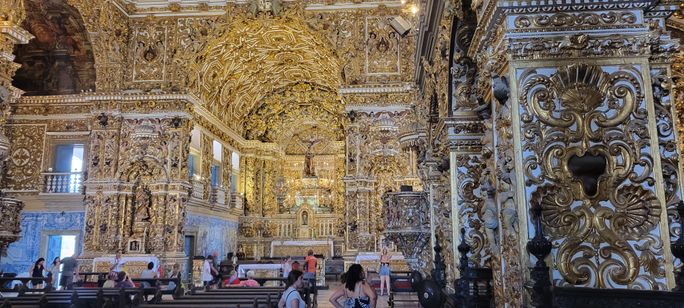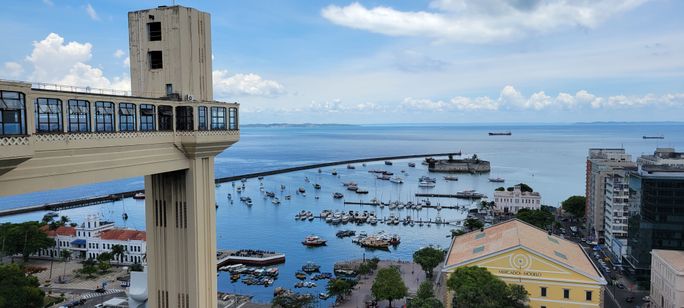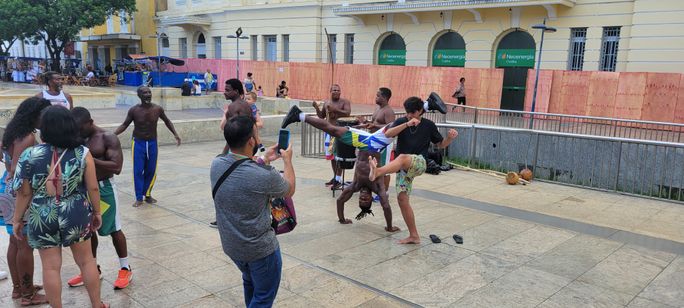
by Brian Major
Last updated: 5:00 AM ET, Mon February 3, 2025
Today��s Black travelers can look to South America to find connections with African culture. Salvador, the capital city of the Brazilian state of Bahia, features a multitude of culinary, fine art, dance, musical and spiritual experiences, activities and attractions inspired by Brazil��s Black population.?
Salvador served as Brazil��s national capital from 1549 to 1763 and was a major port during the transatlantic slave trade. Today, the municipality contains the country��s largest population of African descendants.
Salvador��s historic center is known as the Pelourinho (Portuguese for ��pillory��), in reference to a whipping post that once existed in its central plaza.
From that painful past, an Afro-Brazilian culture expressed in art, music and cuisine emerged in the city. Now, those qualities draw Black travelers �� and anyone eager to explore Brazil��s African influences �� to the city.
��Black travelers are being drawn to experience Brazil partly because of its beautiful beaches and landscapes, but mostly because they are intrigued by the large population of African descendants who call it home,�� said Felicia Fencl, owner of First Choice Travel Group. ��Places like the Afro-Brazilian mecca of Bahia are vibrant, colorful and filled with a majority Black population. There is Afro-Brazilian music playing in the streets, colorful murals and statues, and a strong sense of belonging.��
A drive around Salvador quickly reveals an extensive array of colorfully imaginative street murals; some are small and intimate, while others cover the entire sides of buildings, with many documenting images linked to Afro-Brazilian culture.
A Vibrant Historic Sector
A UNESCO World Heritage Site, Pelourinho features narrow colonial-era streets and broad public plazas lined with baroque architectural structures dating from the period.
Local treasures include the baroque S?o Francisco Church and Convent of Salvador, which has interiors sheathed in stunning gold leaf. Casa do Benin, a performance and gallery space, is a local landmark for Afro-Brazilian culture that celebrates connections between the traditions of Bahia and Benin, West Africa, through art exhibits and educational programs.

S?o Francisco Church and Convent of Salvador features interiors sheathed in gold leaf. (Photo by Brian Major)
Pelourinho is also the cultural base for Salvador��s Afro-Brazilian community, with which visitors can interact on walks along the district��s cobblestone streets. Travelers can expect to encounter Afro-Brazilian street art and artisanal craftwork vendors alongside impromptu displays of capoeira, a martial art practiced for centuries among Black Brazilians that combines dance, music and spirituality.
Salvador also offers contemporary architectural landmarks such as the Elevador Lacerda, a public urban elevator connecting Salvador��s lower and upper cities. Inaugurated in 1873, the 236-foot-high structure first operated as a hydraulic lift before electricity was installed in 1906. The towers were renovated in art deco style in 1930.

Salvador��s Elevador Lacerda. (Photo by Brian Major)
Carnival Intensity
Salvador is at its most vibrant during Carnival season, which begins in February, extending from the Friday before Ash Wednesday to noon seven days later. African musical forms dominate what is annually one of the world��s largest street parties, as the weeklong celebration spans multiple musical circuits across the city. Tractor-trailer trucks equipped with huge sound systems proceed slowly across each circuit, serving as huge moving platforms for ��blocos�� (cultural street bands) that parade day and night through the streets of 12 neighborhoods.
The blocos are divided into ��afro,�� ��afox��,�� ��samba-reggae�� and other categories, each representing a different facet of Bahian culture and history. The music utilizes Bahia��s ��Ax���� Afro-Caribbean rhythms, incorporating reggae, calypso and Brazilian beats.
The public partying is complemented by cultural events held at nightclubs, hotels and musical venues around the city. Ceremonies are also held at temples observing Candombl��, the Indigenous faith shared by Salvador��s African-descendant residents.
Throughout the week, musical acts and residents from every strata of society parade through the streets. The festival��s revelry features an intensity and unity seldom seen outside of the country.
Beyond Salvador��s Shore
Located on a peninsula separating the Bay of All Saints from the Atlantic Ocean, Salvador features white-sand beaches that range from calm coves ideal for swimming and watersports to open-sea inlets with strong waves favored by surfers. A half-hour powerboat ride from Salvador��s harbor takes visitors to Ilha dos Frades, a 3.3-acre offshore island with a pristine environment protected as a federal marine area.
The island��s small cove has a calm-water, sandy beach that��s open to the public but regulated daily to control the number of guests. Umbrellas, beach chairs, snacks and drinks are available for purchase.
While on Ilha dos Frades, travelers would be remiss not to sample the authentic Bahian flavors featured at the Preta Restaurante. Must-try dishes include moqueca (fish stew), acaraj�� (fritters) and vatap�� (shrimp stew).
While on Ilha dos Frades, travelers would be remiss not to
sample the authentic Bahian flavors featured at the Preta
Restaurante. Must-try dishes include moqueca, acaraj��, and
vatap��.

Impromptu Capoeira displays are common in Salvador��s Pelourinho district (Photo by Brian Major)
Linking Up
American travelers will find multiple air links to Brazilian regions, including LATAM Airlines�� thrice-weekly flights between Los Angeles and S?o Paulo. Delta Air Lines has expanded flights between Atlanta and Rio de Janeiro to year-round status.
Additionally, American Airlines recently committed to thrice-daily flights between Miami and S?o Paulo and Rio de Janeiro, and it has also added seasonal service between Dallas/Fort Worth and Rio de Janeiro.
From the fervor of festivals to an immersion in Afro-Brazilian culture, Salvador is a must-experience destination for Black travelers.
��The vibe is electric, and the people are welcoming and accepting,�� said Fencl of First Choice Travel Group. ��Brazil is truly a homecoming experience; it��s definitely a bucket-list destination every Black traveler should experience.��
For the latest travel news, updates and deals, subscribe to the daily TravelPulse newsletter.
Topics From This Article to Explore